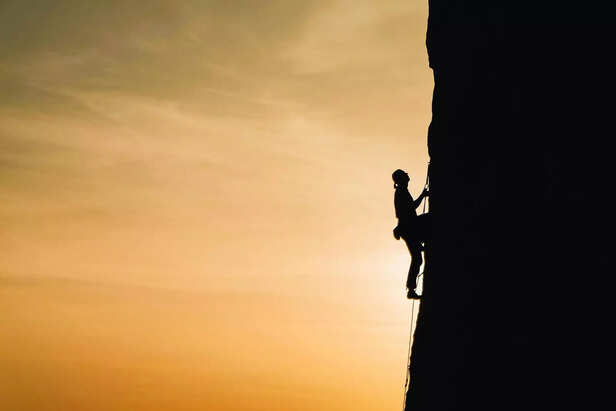Every Morning Is a Choice: The Gita’s Lesson on Action Without Fear
Riya Kumari | Jun 30, 2025, 01:00 IST
( Image credit : Times Life Bureau, Timeslife )
You know that moment when your alarm goes off and, for a solid five seconds, you consider throwing your phone across the room, quitting your job, becoming a barista in Bali, or maybe joining an ashram? Yeah. The Gita gets it. Every morning is a choice—between hitting snooze or suiting up, between dread and do-it-anyway.
Some mornings begin with birdsong. Others begin with doubt. That quiet moment—before your feet hit the floor—is where the battle really starts. Not with the world. But with yourself. Do I get up? Or do I escape a little longer? Do I face what I’ve been avoiding? Or do I scroll? Do I try again—knowing it might not work? The Bhagavad Gita doesn’t come to you with motivational quotes or tidy answers. It arrives like a mirror. Calm, unwavering. And deeply inconvenient when all you want is reassurance. But what it offers is far better than comfort: it gives clarity.
What the Gita Actually Says About Doing

The Gita’s most famous teaching—“You have the right to action, but not to the fruits of action”—is not asking you to stop caring. It’s asking you to stop controlling. We live in a world obsessed with outcomes. What will I get if I try? What’s the point if it doesn’t lead somewhere? We keep our joy, our peace, and our self-worth hostage—tied to results we can never fully command.
And the Gita quietly whispers: do the work anyway. Because action done with fear becomes survival. But action done with presence becomes purpose.
Fear Has a Shape: It Looks Like Inaction

Let’s be honest. Most of us are not lazy. We are afraid. Afraid of failing. Of succeeding. Of being seen. So we plan and postpone. We prepare forever. We say we’re not ready. But readiness isn’t a feeling. It’s a choice. When Krishna speaks to Arjuna on the battlefield, Arjuna’s not unsure about war strategy. He’s unsure about himself. He says, “I can’t do this.” Krishna doesn’t hand him a sword. He hands him a perspective. You’re not asked to be fearless. You’re asked to stop letting fear be the reason you don’t act.
When You Let Go of Results, You Become Free

Letting go doesn’t mean giving up. It means releasing the illusion that you can control life’s every turn. It means showing up without a guarantee. It means learning to trust the act itself. Write the book, even if no one reads it. Apologize, even if they don’t forgive.
Love, even if it ends. That’s courage. And that’s karma. Will you let fear set the tone, or will you move anyway? Not because it’s easy. Not because you know what will happen. But because stillness, when it comes, doesn’t arrive from avoiding life. It comes from living it—with clarity, and without fear.
The Battle Is Not Outside You. It’s Within

Every day, the battlefield is remade—in deadlines, conversations, choices. The inner voice that says, “Not today” is louder than we like to admit. But so is the one that says, “Do it anyway.” The Gita is not some poetic sermon from another world. It’s a manual for people like us—people with doubts, distractions, deadlines. It reminds us that action rooted in purpose—not fear—leads to peace.
You don’t need to wake up inspired. You need to wake up willing. Willing to begin. Willing to not know. Willing to be uncomfortable. Every morning is a question:
Let this linger:
You will never control the result. But you can always choose your part. And that is where your power begins. So tomorrow morning, when the doubts come again, say to yourself—softly, but clearly:
“I act. I do not fear.”
What the Gita Actually Says About Doing

Rock climbing
( Image credit : Pexels )
The Gita’s most famous teaching—“You have the right to action, but not to the fruits of action”—is not asking you to stop caring. It’s asking you to stop controlling. We live in a world obsessed with outcomes. What will I get if I try? What’s the point if it doesn’t lead somewhere? We keep our joy, our peace, and our self-worth hostage—tied to results we can never fully command.
And the Gita quietly whispers: do the work anyway. Because action done with fear becomes survival. But action done with presence becomes purpose.
Fear Has a Shape: It Looks Like Inaction

Start
( Image credit : Pexels )
Let’s be honest. Most of us are not lazy. We are afraid. Afraid of failing. Of succeeding. Of being seen. So we plan and postpone. We prepare forever. We say we’re not ready. But readiness isn’t a feeling. It’s a choice. When Krishna speaks to Arjuna on the battlefield, Arjuna’s not unsure about war strategy. He’s unsure about himself. He says, “I can’t do this.” Krishna doesn’t hand him a sword. He hands him a perspective. You’re not asked to be fearless. You’re asked to stop letting fear be the reason you don’t act.
When You Let Go of Results, You Become Free

Freedom
( Image credit : Pexels )
Letting go doesn’t mean giving up. It means releasing the illusion that you can control life’s every turn. It means showing up without a guarantee. It means learning to trust the act itself. Write the book, even if no one reads it. Apologize, even if they don’t forgive.
Love, even if it ends. That’s courage. And that’s karma. Will you let fear set the tone, or will you move anyway? Not because it’s easy. Not because you know what will happen. But because stillness, when it comes, doesn’t arrive from avoiding life. It comes from living it—with clarity, and without fear.
The Battle Is Not Outside You. It’s Within

Imperfect
( Image credit : Pexels )
Every day, the battlefield is remade—in deadlines, conversations, choices. The inner voice that says, “Not today” is louder than we like to admit. But so is the one that says, “Do it anyway.” The Gita is not some poetic sermon from another world. It’s a manual for people like us—people with doubts, distractions, deadlines. It reminds us that action rooted in purpose—not fear—leads to peace.
You don’t need to wake up inspired. You need to wake up willing. Willing to begin. Willing to not know. Willing to be uncomfortable. Every morning is a question:
Let this linger:
“I act. I do not fear.”
